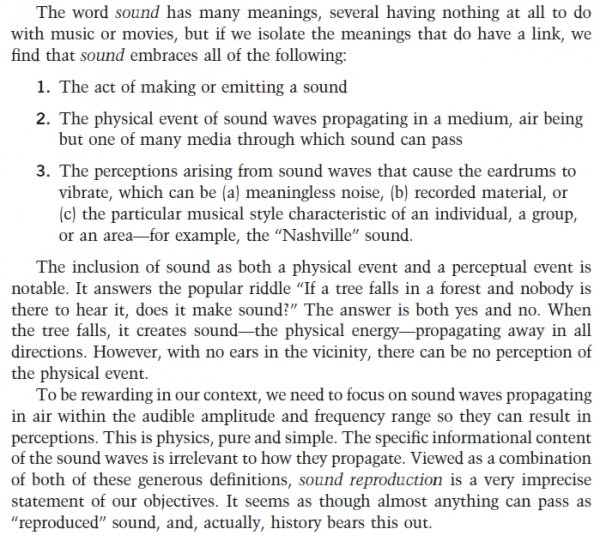Ok, here goes. Dr. L said:
Personally, I disagree.
It goes to the definition of "sound." Is sound the physical disturbance of the air particles, the mechanical energy (moving at the speed of sound), or is sound the way that mechanical energy is shaped by the physical structure of our heads, ears, the tree to our left, the length of the grass, the woman standing in front of us, the lifts in our shoes changing our height perspective, and the cues our brains take from all of that to process into what we percieve? I think there is sound that precedes manipulation by the physical environment. Your system makes sound. It sounds different in your room than it would in mine, than it would in Jack's, and even if it is playing in an anechoic chamber, where the environment has been neutralized and has no effect, it still makes sound. Even if it plays into a pair of in-ear headphones, which is very close to a direct connection to your eardrum, and the environment and the physical manipulations of your hair, head, outer ear and even most of your ear canal are neutralized, it still makes sound.
Or at least that's the way I see it. YMMV.
Perception? Real perception as opposed auditory memory filling in the blanks, imagination fullfilling expectations, etc? Grossly overblown in the audiophile community, IMO. The kind of processing Linkwitz is talking about above, in which the brain hears the soundwave filtered through hair, outer ear etc. and knows to process the changes those physical properties make to the loudness and FR and hear that as "behind me, over my left shoulder, slightly above my head." My God that perceptual processing is remarkable! But it's also remarkably consistent, in spite of the fact that you may have ears that lay flat against your head below a mass of thick curly hair and I may have ears that stick out from a head with nearly no hair at all. None of that explains the incredible variations audiophiles report hearing. That's something else altogether.
Tim







